Sword Noir: A Role-playing Game of Hardboiled Sword & Sorcery
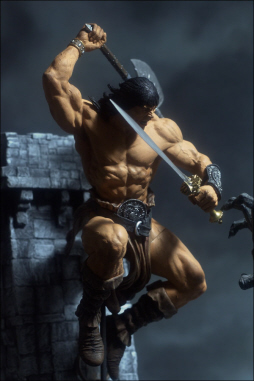 Imagine Conan in Shadizar, meeting with a beautiful woman calling herself Fortuna who pays him to find Thuris, the man who kidnapped her younger sister. Conan accepts the woman’s coin but finds himself in the middle of double and triple crosses as Fortuna — known as Brigid the Bold in the underworld — seeks for the Falcon of Maltus along with her betrayed confederates, Jubliex Cairo, Wilmer the Younger, and Gutmar.
Imagine Conan in Shadizar, meeting with a beautiful woman calling herself Fortuna who pays him to find Thuris, the man who kidnapped her younger sister. Conan accepts the woman’s coin but finds himself in the middle of double and triple crosses as Fortuna — known as Brigid the Bold in the underworld — seeks for the Falcon of Maltus along with her betrayed confederates, Jubliex Cairo, Wilmer the Younger, and Gutmar.
Think of Fafhrd and the Grey Mouser hired by the powerful merchant Sternwood to scare ne’er-do-well Geiger away from the merchant’s daughter Carmen, only to be caught up in blackmail, murder, kidnapping, and family secrets.
Yes, those were the plots of The Maltese Falcon and The Big Sleep using three of the iconic characters of sword & sorcery. That’s what I’d call Sword Noir, and that’s what I called the role-playing game I just published, subtitled A Role-playing Game of Hardboiled Sword & Sorcery.
Sword Noir is a game now, but it started as something a little more than a conceit and little less than a genre. Basically, I attempted to give some kind of short-hand to the stories I wrote.
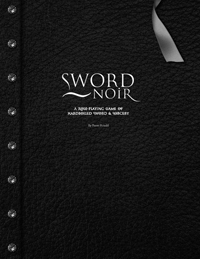 As usual, the kind of stories I was reading and writing bled into the kind of games I was playing, and this took me down a path I did not expect. I ended cobbling together a system that was purpose built to play “sword noir.” In order to do that, I had to define the term.
As usual, the kind of stories I was reading and writing bled into the kind of games I was playing, and this took me down a path I did not expect. I ended cobbling together a system that was purpose built to play “sword noir.” In order to do that, I had to define the term.
This is what I came up with: Characters’ morals are shifting at best and absent at worst. The atmosphere is dark and hope is frail or completely absent. Violence is deadly and fast.
The characters are good at what they do, but they are specialists. Trust is the most valued of commodities – life is the cheapest.
Grim leaders weave labyrinthine plots which entangle innocents. Magic exists and can be powerful, but it takes extreme dedication to learn, extorts a horrible price, and is slow to conjure.
This all informed the design of the game, and it really helps to divide sword noir from straight up sword & sorcery. Early sword & sorcery — or S&S — shared many stylistic similarities to hardboiled fiction — which we’ll just call noir for short — but both the intersections and the differences helped to inform the concept of sword noir.
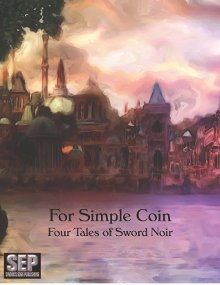 Let’s unpack the definition. First off, the characters — both those of the player’s and those run by the gamemaster—have questionable morals. This fits with both S&S and noir, though the characters of S&S seem to be somewhat more brutal than those of noir. Sam Spade could get two-fisted and was no paragon, but Conan seemed a lot more ready to gut a man. Of course, in some of the modern noir stories, that distinction is not so differentiated.
Let’s unpack the definition. First off, the characters — both those of the player’s and those run by the gamemaster—have questionable morals. This fits with both S&S and noir, though the characters of S&S seem to be somewhat more brutal than those of noir. Sam Spade could get two-fisted and was no paragon, but Conan seemed a lot more ready to gut a man. Of course, in some of the modern noir stories, that distinction is not so differentiated.
The dark atmosphere of sword noir is in keeping with both traditions, but I believe it dips slightly toward noir. While the stories of S&S may be in a word of grim corruption, the tone tends to have at least sprinklings of swashbuckling bravado. Noir, on the other hand, swims in its dark tone.
While there is some of the paladin in Philip Marlowe, there is no Captain Blood or the Scarlet Pimpernel. This is — of course — a game, and I am not about to tell someone they are having “badwrongfun” if a little Robin Hood slips into their sword noir.
Deadly, quick violence I would put in the noir column. The rules for combat in Sword Noir are such that a lucky hit by even the weakest of opponents can lay a character out. And the gods help you if you are outnumbered. This is certainly not the world of Conan or Fafhrd and the Grey Mouser.
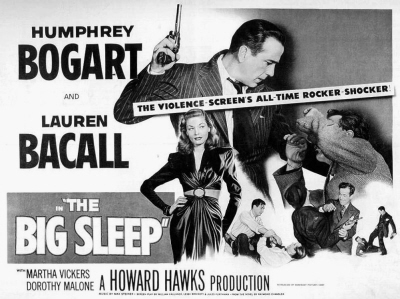 In Sword Noir, violence is a last resort, and it should not be undertaken lightly. This may be contrary to the games with which many of us — myself included — grew up, but given that the adventures and thus the tone is more noir than sword, making violence actually deadly seemed to fit.
In Sword Noir, violence is a last resort, and it should not be undertaken lightly. This may be contrary to the games with which many of us — myself included — grew up, but given that the adventures and thus the tone is more noir than sword, making violence actually deadly seemed to fit.
The trope of characters as specialists is honestly an outgrowth of the standard RPG group. It is rare that one character adventures alone, so having generalists is problematic. Characters need their chance in the spotlight, and specialities help achieve this. Get that fast-talker in there when negotiations are on tap, then give that thief the chance to shine when a lock needs to be cracked.
Trust is so important in the world(s) of sword noir as betrayal is so common. If one finds a person who keeps her word, who honours her deals, one goes back to deal with that person again — especially if that person is a sword for hire who gets the job done with little fuss, though perhaps some muss. Characters who follow a moral code, who act with honor even in the dire corruption of the game Sword Noir, gain mechanical rewards. This reinforces how the characters are supposed to act. These are the heroes, like Marlowe, who may have some of the paladin hidden within.
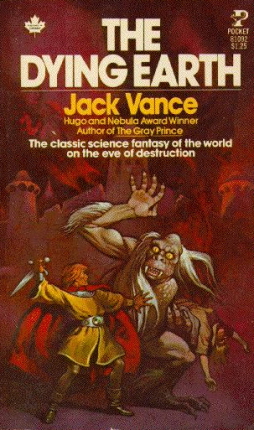 Labyrinthine plots exist in both S&S and noir, but in thinking of sword noir, I was definitely coming down on the side of noir. I do not believe — though I could certainly be wrong — that there exists an S&S tale with The Big Sleep’s level of complexity. Even a movie like Out of the Past is rife with twists and turns and betrayals. Most of the adventures that I run in Sword Noir are based on hardboiled fiction or film noir, so that inspiration shows.
Labyrinthine plots exist in both S&S and noir, but in thinking of sword noir, I was definitely coming down on the side of noir. I do not believe — though I could certainly be wrong — that there exists an S&S tale with The Big Sleep’s level of complexity. Even a movie like Out of the Past is rife with twists and turns and betrayals. Most of the adventures that I run in Sword Noir are based on hardboiled fiction or film noir, so that inspiration shows.
Finally there is the magic, which is inspired solely by S&S. When one considers the heroes of S&S, magic is not usually present. Now, there is always Elric — and perhaps one can argue for some of the anti-heroes from The Dying Earth — but in general, magic is in the hands of the villains and it is something man was not meant to know. That is how it is portrayed in Sword Noir, and while player characters’ have access to it, they’ll pay a price both for gaining the knowledge and for using it.
While the sword & sorcery/hard-boiled detective crossover genre is small, there have been a few writers who have done some fine work. While I haven’t read them all I can mention some of the most popular, including:
- Alex Bledsoe ‘s three Eddie LaCrosse novels, starting with The Sword Edged Blonde
- Glen Cook’s Garratt, P.I. books
- Steven Brust’s Tekla novels
- Larry Correia’s Grimnoir Chronicles
So that, in something far more than a nutshell, is sword noir. My story “A Dead Pound of Flesh” in Black Gate 15 is somewhat a sword noir tale — or possibly sword & sandal noir — so if you liked that, you might be a fan of Sword Noir.
Just finished reading “For a simple coin” and wanted to say thank you for making this available on two formats, PoD & PDF, for international readers such as myself, who doesn’t have access to a digital reader other than acrobat(and love the printed format).
Regarding the collection, I’d read a novel-length story set in Floatsam any day. Also the supporting characters in all four tales are colorful and hint to their personal history, despite their brief appearance (the “Singer-Flute-Harper gang” from “Of Shadows and Flute” come to mind).
Thanks again and good luck with any future stories!
Hi periklis. Thanks for the kind words and thanks for supporting my efforts. I have a few more stories in the Sword Noir genre that I am working on, but nothing set in Flotsam . . . yet. I hope you’ll get a chance to read them in the future. Take care and thanks again. Fraser
[…] As the author described it: “Now is the time for your characters to walk down mean streets, drenched in rain, hidden in fog, and unravel mysteries, murders, and villainy.” (See Fraser’s complete overview in his most recent post for the Black Gate blog here). […]
[…] have sold another publisher on Sword Noir or Kiss My Axe (discussed earlier on the Black Gate blog here and here)? I honestly don’t know. I started writing modern d20 adventures and supplement […]